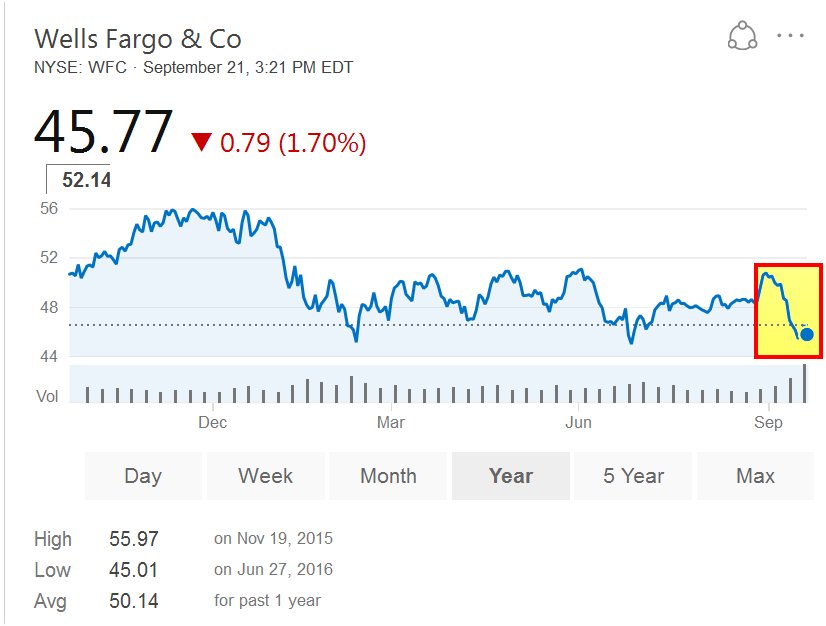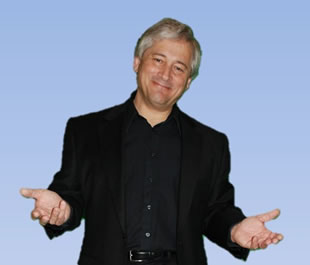
When The Bottom Line Goes Through The Heart
Like me, I’m sure you’re following the Wells Fargo story in the news right now. In the days since the story broke on September 9th, their share price has fallen by about 10 percent, with no reason to think that won’t continue. On a year-long graph, it looks like stepping off a cliff. That cliff represents ordinary peoples’ investments – their retirements, their college funds, their life savings.
Sometimes it can be fun to ridicule the “touchy-feely” and the “soft skills” in a workplace as something worthless that’s done only to placate people or to check a box. And of course, we all know bosses who really believe that team ethics and group dynamics have nothing to do with the bottom line. Sometimes, and often after a particularly worthless training session, we even agree. But then I think of the family whose investments just tanked by ten percent in ten days, and who now can’t afford to send their daughter to college.
In the late 1960s, American sociologist Donald Cressey invented the “Fraud Triangle” as a way of explaining the erosion of personal and team ethics. In Cressey’s model, there are three moving parts. First, PRESSURE to commit fraud, for example unrealistic sales targets. Second, OPPORTUNITY, for example access to somebody’s private bank account. Third, RATIONALIZATION, the old “everybody’s doing it” argument we used to use on our parents.
Following the Enron collapse in 2001, the Sarbanes-Oxley Act of 2002 was introduced to combat the Fraud Triangle. Looking for a way to tackle team ethics, the Securities and Exchange Commission (SEC) developed PCAOB Audit Standard 2 of 2004 from Sarbanes-Oxley, quoting as the only offered example of good compliance a document called the COSO Framework 2013 in which the first of 17 stated ethical principles is “Lead by Example”, defined as “the organization demonstrates a commitment to integrity and ethical values”.
And so, at last, the “touchy-feely” idea of team ethics and values became a cornerstone of the hard-nosed financial system at the heart of the legendary “bottom line”. An idea like this is revolutionary. Who’d have thought that the tough old SEC would step away from mechanistic systems and procedures and instead embrace the human being at the center of it all?
The truth underlying Sarbanes-Oxley and the new SEC regulations is that all systems will be gamed for as long as the proper group dynamics and common value sets are not there. When the holes are fixed, the holes themselves will be gamed, and the giant merry-go-round will continue for as long as the calliope plays. It’s time we stopped referring to teamwork and leadership as “soft skills” or “a matter of opinion”, because in fact there’s nothing harder – and opinion turns out to be everything. A share price is nothing more than an opinion, which is where we came in.
It’s tempting to think that we can solve problems in systems with more and better systems, and typically that’s the response from unprepared executives in crisis mode, desperate to keep the share price up and their jobs held down. But as anyone who has ever tried to put an unwilling two-year-old to bed can attest, for every “doing it” way of doing something, there are half a dozen “not doing it” ways. We don’t lose these skills as we age; we just get more subtle and covert at doing the same things.
If the hard-nosed SEC recognizes an investment in team dynamics as essential to the bottom line, that should be good enough for all of us. Invest in people, invest in team and leadership development, invest in values, or the game never ends.
Just ask Wells Fargo.


Engage us on Facebook
Follow us on Twitter
Tweets by @mymcmedia